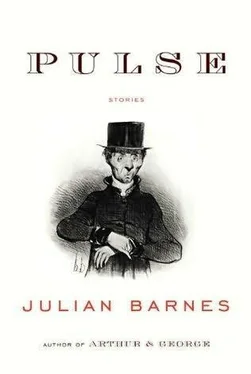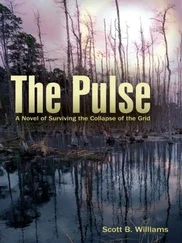‘Don’t worry, Mum, I’ll be along. Ten, fifteen minutes.’ I didn’t have anything else to do. But before I could hang up, Janice, who’d been monitoring my end of the conversation, shouted across at me,
‘Why can’t she call the fucking AA or RAC?’
It was obvious that Mum would have heard, and that this was what Janice had intended.
I put the phone down. ‘You can come too,’ I said to her. ‘And lie under the car while I jack it up.’ As I fetched the car keys, I thought to myself: right, that’s it.
Most people don’t like to bother their doctor. But most people don’t like the idea of being ill. And most people don’t want to be accused, even implicitly, of wasting the doctor’s time. So in theory, going to the doctor is a win-win situation: either you come out confirmed as healthy, or else it’s true that you haven’t been wasting the doctor’s time. My father, his scan revealed, had a chronic sinus condition for which he was prescribed antibiotics followed by more nasal spray; beyond that lay the possibility of an operation. My mother, after blood tests, EMG and MRI, and then a process of elimination, was diagnosed with motor neuron disease.
‘You’ll look after your father, won’t you?’
‘Of course, Mum,’ I replied, not knowing if she meant the short term or the long term. And I expect she had a similar exchange with Dad about me.
My father said, ‘Look at Stephen Hawking. He’s had it for forty years.’ I suspect he’d been on the same website as I had; from which he would also have learnt that fifty per cent of MND sufferers die within fourteen months.
Dad was incensed by the way they handled it at the hospital. No sooner had the specialist explained his conclusions, than they took Mum and Dad down to some supply room and showed them the wheelchairs and stuff which would become necessary as her condition inevitably deteriorated. Dad said it was like being taken to a torture dungeon. He was very upset, for Mum’s sake mainly, I think. She took it all calmly, he said. But then she’d worked at that hospital for fifteen years, and knew what its rooms contained.
I found it hard to talk to Dad about what was happening – and he to me. I kept thinking: Mum’s dying, but Dad’s losing her. I felt that if I repeated the phrase enough times, it would make sense. Or stop it happening. Or something. I also thought: Mum’s the one we turn to when anything goes wrong; so who do we turn to when something goes wrong with her? In the meantime – waiting for the answers – Dad and I discussed her daily needs: who was looking after her, how her spirits were, what she’d said, and the question of medication (or rather, the lack of it, and whether we should push for Riluzole). We could, and did, discuss such matters endlessly. But the catastrophe itself – its suddenness, whether we might have seen it coming, how much Mum had been covering up, the prognosis, the unavoidable outcome – these we could only hint at from time to time. Perhaps we were just too exhausted. We needed to talk about normal English things, like the probable effect on local businesses of the proposed ring road. Or I would ask Dad about his anosmia and we would both pretend it was still an interesting subject. The antibiotics had worked at first, making smells come back in a rush; but soon – after about three days – the effect wore off. Dad, being Dad, didn’t tell me at the time; he said it felt like an irrelevant joke, given what was happening to Mum.
I read somewhere that those who are close to someone who’s seriously ill often take to doing crossword puzzles or jigsaws in their hours away from the hospital. For one thing, they don’t have the concentration for anything more serious; but there’s also another reason. Consciously or unconsciously, they need to work at something with rules, laws, answers, and an overall solution; something fixable. Of course, illness has its laws and rules and sometimes its answers, but that’s not how you experience it at the bedside. And then there’s the remorselessness of hope. Even when hope of cure is gone, there is hope for other things – some specific, others not. Hope means uncertainty, and persists even when you’ve been told there is only one answer, one certainty – the single, unacceptable one.
I didn’t do crosswords or jigsaws – I don’t have that sort of mind, or patience. But I became more obsessive about my exercise programme. I lifted more weights and increased my time on the step machine. On Friday runs, I found myself at the front of the pack, with the heavy guys who don’t do chat. That suited me fine. I wore my heart monitor, checked my pulse, consulted my watch, and occasionally I talked of the calories I’d done. I ended up fitter than I’d been at any time in my life. And sometimes – crazy as it may sound – that felt like solving something.
I sublet my flat and moved back in with my parents. I knew Mum would be against the idea – for my sake, not hers – so I merely presented her with the fait accompli. Dad took leave of absence from his office; I cut out all extra curricular activities; we called in friends, and later nurses. The house sprouted handrails, then wheelchair ramps. Mum moved downstairs; Dad never spent a night apart from her, until she went to the hospice. I remember it as a time of absolute panic, but also a time with a rigorous daily logic to it. You followed the logic, and that seemed to hold the panic at bay.
Mum was amazing. I know MND sufferers are statistically less likely to be depressed about their condition than patients with other degenerative illnesses, but even so. She didn’t pretend to be braver than she was; she wasn’t afraid to cry in front of us; she didn’t make jokes to try and cheer us up. She treated what was happening to her soberly, without flinching from it or letting it overwhelm her – this thing that was going to crush out her senses one by one. She talked herself – and us – through her life and our lives. She never referred to Janice, or said she hoped I’d eventually have her grandchildren. She didn’t lay anything on us, or make us promise stuff for afterwards. There was a stage when she weakened dramatically and every breath sounded like a hike up Everest; then I wondered if she was thinking about that place in Switzerland where you can make a decent end to it all. But I dismissed the thought: she wouldn’t want to put us to such bother. This was another sign that she was – as far as she could be – in charge of her own dying. She was the one who made sure the hospice was lined up, and told us it was better to move sooner rather than later, because you could never predict when places became free.
The bigger the matter, the less there is to say. Not to feel , but to say. Because there is only the fact itself, and your feelings about the fact. Nothing else. My father, faced with his anosmia, could find reasons why such a disadvantage might, if viewed from the right perspective, become an advantage. But Mum’s illness was in a category way beyond this, beyond rationality; it was something enormous, mute and muting. There was no counter-argument. Nor was it a matter of not being able to find the words. The words are always there – and they are always the same words, simple words. Mum’s dying, but Dad’s losing her. I always said it with a ‘but’ in the middle, never an ‘and’.
I was surprised to get a call from Janice.
‘I’m very sorry to hear about your mother.’
‘Yes.’
‘Is there anything I can do?’
‘Who did you hear from?’
‘Jake.’
‘You’re not seeing Jake, are you?’
‘I’m not seeing-seeing Jake, if that’s what you’re asking.’ But she said it in a frisky tone, as if excited that she might, even now, be provoking a stir of jealousy.
Читать дальше











